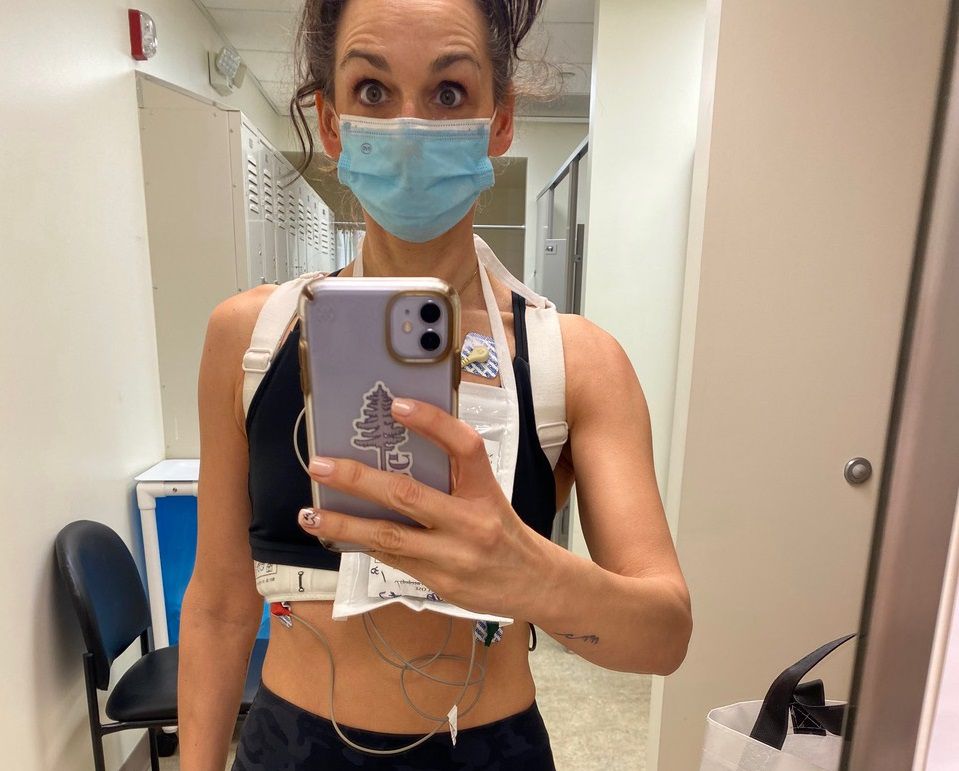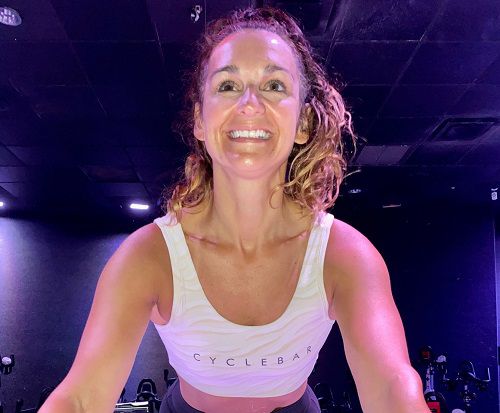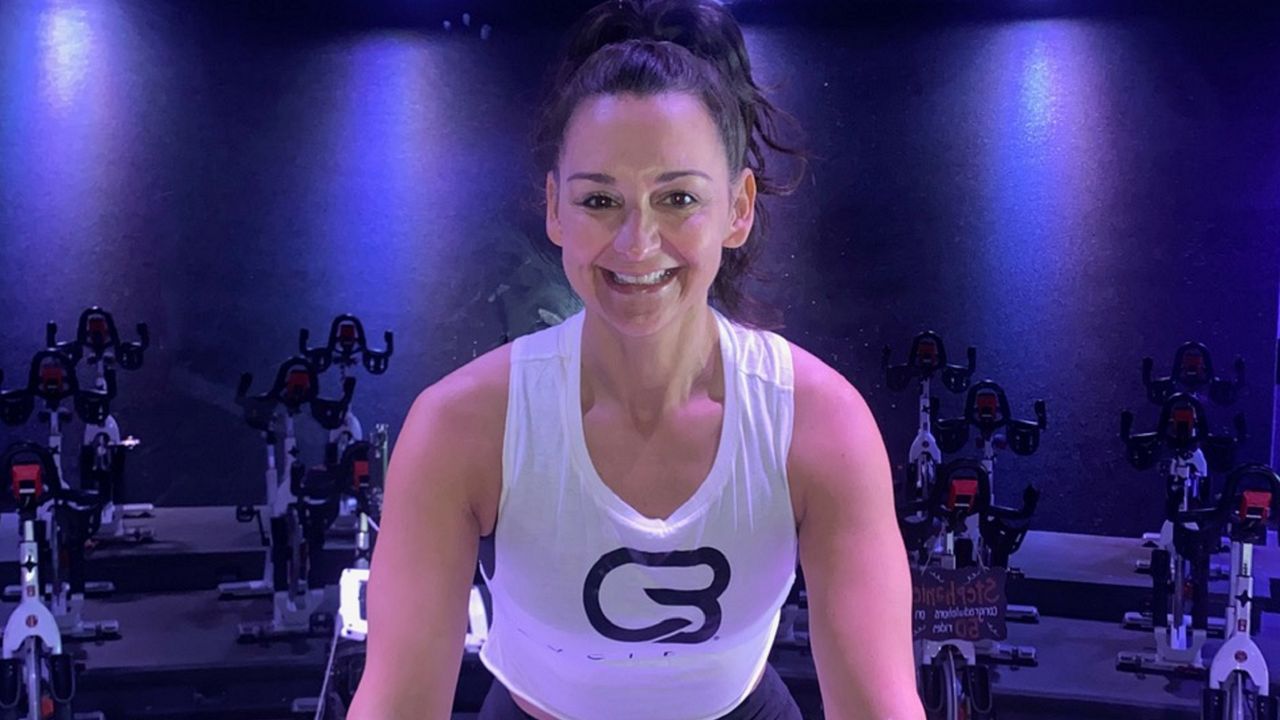FLORENCE, Ky. — A few years ago, anyone who looked at Ratona Harr would think she’s the pinnacle of health.
The mother and wife worked out often, served as a CycleBar instructor and taught yoga at her Florence, Ky., studio, Full Body Fitness and Yoga.
But on the inside, little did anyone, including Harr, know that she had a total blockage of the main artery in her heart.
On Feb. 27, 2021, at the age of 44, Harr suffered a massive heart attack. Doctors refer to her condition as a “widowmaker” because the survival rate is incredibly low.
Now, two years later, Harr is using her story to raise money to promote heart health awareness and to send a reminder to women to put their own bodily needs in front of the wants of others.
What You Need To Know
- Fitness instructor Ratona Harr suffered a massive heart attack two years ago, and now she's using her story to promote heart health to other women
- Ratona noted "feeling off" three days before her medical scare, but she largely ignored it because the idea of a heart attack wasn't on her radar
- She's hosting a charity ride at a CycleBar studio in Hyde Park later this month to raise money for the American Heart Association
“You need to listen to your body,” said Harr, who spent six months recovering from her heart attack.
The strength Harr spent every day building got “zapped,” she said. She couldn’t walk up my stairs without heavy breathing, Harr said. Doctors made her wear a “life vest” — a wearable defibrillator that can stop an abnormal heart rhythm — from February until July “just in case.”
“And that could have all been avoided had I just paid attention to a little discomfort I had in my chest three days before my heart attack,” she added.
For a long time, Harr asked questions about why she had a heart attack. She didn’t have any of the typical warning signs of heart trouble — she was healthy, wasn’t overweight, and she didn’t have diabetes or hypertension, which are linked commonly to heart disease.
To see if her kids would be at risk down the road, she also had a genetic test, Harr said, to see if she had genetic markers for any heart conditions. She didn’t.
“I think the moral of the story is it can happen to anybody,” she added.
In the United States, 20.6% of all deaths are related to heart disease in 2020, according to data from the Centers for Disease Control and Prevention (CDC). The breakdown is 21.6% of men and 19.5% of women.
Heart disease is the leading cause of death for both men and women across most racial demographics.
Heart attacks happen in the U.S. once every 40 seconds.
The CDC said about 20% of those 805,000 are “silent,” meaning damage is done, but the person is not aware of it. That could leave someone more vulnerable to a second attack, said Dr. Anisiia Crowley, a UC Health cardiologist.
Crowley is an assistant professor in the Division of Cardiovascular Health and Disease at the University of Cincinnati College of Medicine. In her professional career, she hasn’t seen stories like Harr’s often, but they happen.
That’s what makes them important to tell, she added.
Crowley isn’t Harr’s physician, so she couldn’t comment on her medical or family history. But she pointed out that sometimes cardiac disease can be in more distant relatives.
“It’s a common belief that people who are fit and physically active cannot suffer a heart attack, but that’s far from the truth,” Crowley said. “While it’s not as common, it’s seen with enough significant frequency that we should acknowledge that it’s a misconception.”
Even though Harr didn’t realize she was at risk of a heart attack, she knew she’d “felt off” in the days leading up to when it happened.
She described feeling an “immediate, strong discomfort and pressure” while teaching an early-morning cycle class on Feb. 25, 2021.
“It was a constant pain in my chest that would not go away. It lasted all day. It was just uncomfortable,” she said.
She ended up getting off her bike, but she kept teaching from the studio floor.
“I’d never experienced anything like that before,” she added. “I could breathe fine. I could think clearly. I could still walk and I could still teach, so that’s what I did.”
Following the class, Harr said she went to her manager and told them she wasn’t feeling great, but committed to teaching again at noon that day.
Afterward, she drove to a pharmacy to get indigestion medication and napped for a few hours.
“The pain never went away,” she said, but Harr went back to teach her 5 p.m. class that evening.
“I taught three classes that day while I’m having discomfort in my chest because I don’t even think in my mind I have a heart problem,” she added. “It wasn’t even on my radar.”
The pain was gone the next morning, Harr said. But she still felt off. She went on to have a normal day — doing everything she did as a mom, wife and business owner.
Three days later, Harr nearly died.
“Don’t ignore what your body is telling you,” she added. “I should have just gone to the doctor and said I got something off and they would have figured out what was wrong with me, and I would have avoided a lot of traumas for me and my family.”
Trust your body, know the symptoms
Most people know the most common symptom of a heart attack: Chest pain. But many women experience more subtle signs of heart distress that could manifest itself as something else, potentially anxiety or even heartburn.

One example is extreme fatigue — “This isn’t, ‘I’m really tired.’ This is, ‘I can barely pick up my kid from school or make dinner,’” as Crowley described it. She listed other indicators like indigestion, sometimes dizziness or lightheadedness, and cold sweats that “seem to come out of nowhere.”
Women can also suffer what’s called a MINOCA, or a myocardial infarction (a heart attack) with non-obstructive coronary arteries, where they suffer an attack despite not having a blockage.
“If you see any symptoms of heart issues, seek medical care right away,” Crowley said, adding that “time is of the essence.”
Reaction time can mean a lot more than lengthy hospital stays and a lot of cardiac rehabilitations, Crowley said.
If a person seeks immediate medical care after the onset of a heart attack or stroke, their outcome is always much better, she said. Each minute that passes without medical treatment means the death of more cells that can never recover.
“It’s always better to find out that it’s ‘just reflux’ than to not seek treatment for something more serious,” Crowley said.
Harr believes many women are so concerned with taking care of everyone else that they don’t stop to take care of themselves. “Not even when we have a pain in our chest that doesn’t go away all day,” she said.
Crowley, a mother of two young children, knows how busy life can become. She stressed women should “treat their hearts with the same care” they would for everyone else in their life.
Getting back on the bike
To bring further awareness to her story, Harr is hosting a “Cycle Gives” fundraiser on March 26 at the CycleBar Cincinnati studio in Hyde Park. The charity ride costs $10 a person, and 100% of the proceeds are going to the American Heart Association, Harr said.

Those interested can call 513-312-7920.
“The old adage is exercise is medicine, and it really is medicine,” Crowley said. She noted even moderate exercise can lower a person’s blood pressure, heart rate, sugar levels. More broadly, it can be a key in preventing heart attack, stroke and diabetes.
Crowley doesn’t recommend anyone with a heart issue to jump back into exercise at full strength right away.
Harr had to ease her way in it. She took half a year to get back to a place where she felt comfortable getting back on the bike. Now, she’s most of the way back.
“Perfect is the enemy of good,” Crowley said. “I always tell my patients even if you start one or two days a week for five minutes, that is better than not doing anything at all. And then, once folks start, they find it just easier to build up.”
Harr had a message for everyone who’s working out: Do not push yourself past the limits, even if you’ve never had a heart attack or not.
“That extra bit of exercise isn’t worth it,” she said.



